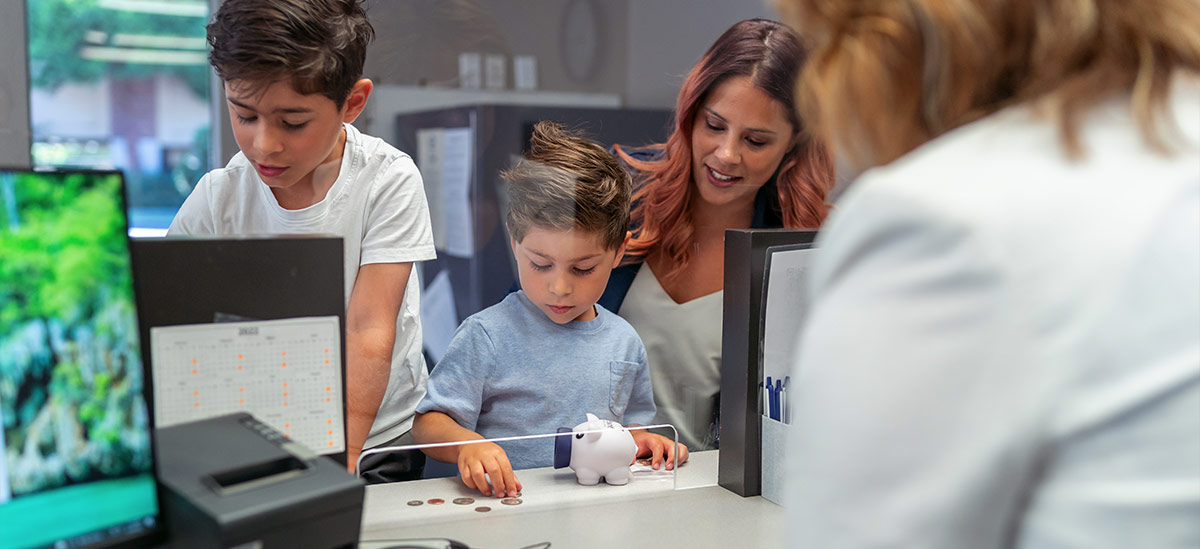
From young children managing their allowances to teens earning their first paycheck, there’s nothing quite like hands-on experience to teach a child financial responsibility.
As children begin to learn more about managing money, a trip to the bank to open a checking or savings account may be the next logical step. But how old does a child have to be to open a bank account? The answer may surprise you.
While they may not be able to open an account on their own, there are several ways to give minors access to a bank account. Here are some of the most commonly asked questions - and answers - about kids and banking.
At What Age Can You Open A Bank Account On Your Own?
Generally, a child must be at least 18 years of age to open a bank account on their own, with some variability by state. However, there are several options that allow children and teens to access the banking experience before 18 with an adult cosigner or custodian[1].
While it may not be possible to open a bank account while under 18 without a parent or guardian, there are options that allow children and teens to access the banking experience.
What Are The Options For Minors?
When setting up a bank account for a minor, you must decide on both the account title and the type of account. A parent or guardian can set up a custodial account for the benefit of a minor or establish a joint account with the minor. The most common types of minor bank accounts are checking accounts or savings accounts. Considering the minor's age and the purpose of the account can help you determine which options may be most appropriate.
Account Title: Custodial
A custodial account is set up by a parent or guardian on behalf of the minor. While the minor is the beneficiary of the funds, control of the account remains with the custodian until the child reaches a specified age, often 18 or 21, depending on state regulations[2].
This type of account is especially useful for ensuring funds are used for the benefit of the minor.
Custodial accounts are often used as a savings tool for larger expenses, such as college tuition. Minors do not have direct access or control over the funds until they reach legal age. However, once the minor reaches age 18, 19, or 21 (depending on the state), the custodian can deliver the funds to the minor, and account becomes theirs and they are free to do whatever they want with the money. Depending on your goals, this immediate and unregulated access may be a significant drawback.
Account Title: Joint
If you prefer that the child have access to the account while they are still a minor and still want to maintain some control after they reach the age of majority, a joint account may be the preferred option. This type of account is opened in the names of both the minor and the parent or guardian. Both parties have equal access to the account and can make deposits and withdrawals. However, depending on the account, the adult may be able to supervise or limit the minor’s activity. For example, you may be able to cap the amount the child can withdraw and receive spending notifications.
A joint account may provide a greater opportunity for the minor to learn about banking under the supervision of an adult. Since both parties have access, joint accounts can also provide greater flexibility. However, giving a minor direct access to the account could increase the chances of mismanagement.
Account Type: Savings and/or Checking
Once a child hits their teen years, consider introducing a checking account. This requires more financial responsibility and will teach them how to balance an account, keep track of spending limits, and more. A teen checking account may come with a debit card and ATM access, as well as mobile and/or online banking. Many teen checking accounts also provide the co-owner with spend tracking and alerts, and the ability to transfer funds to the teen’s account.
What Will A Minor Need To Open A Bank Account?
While each banking institution may have its own requirements, typically, you’ll need the following information to establish a bank account for a minor:
- The minor’s name, date of birth, and Social Security number
- The parent or guardian’s Social Security number
- The parent or guardian’s valid photo ID (e.g., driver’s license or passport)
- The parent or guardian’s contact information (e.g., phone number or email address)
- Cash or a check for the initial deposit (if required)
What To Look For When Choosing A Bank Account For A Minor
Many banks offer special accounts for minors. When comparing your options, look for an account with a low or no minimum balance requirement and no monthly maintenance fees.
This can help children learn about money management without requiring a large financial commitment or ongoing costs.
You may also look for accounts that offer specific features that are important to you, such as an interactive online banking experience, the ability to monitor transactions, and an educational component.
Empower Tomorrow's Savers Today
It’s never too early to set a child up for a bright financial future. By introducing minors to responsible banking, you can help ensure they’re prepared to confidently navigate their finances in the future.
At PNC Bank, we're committed to providing tools and options tailored to the needs of every age group, including young savers. Contact our team today to learn more about our checking and savings options for minors.




